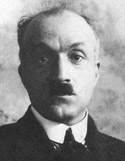AHMET HAŞİM
 Writer and poet (b. 1887, Baghdad - d. 4 June 1933, İstanbul). He was a son of Arif Hikmet Bey, who was a district governor. His childhood passed in Baghdad. When he was 12 years old, he lost his mother and came to İstanbul with his father. After attending Nümune-i Terakki School for a year, he entered Galatasaray High School and later he enrolled at the Law School while he was working at the Tobacco Administration. However, he left Law School and became a teacher at the İzmir High School. After working as a teacher for two years, he worked as the Principal Clerk in the Ministry of Finance for a while. He served as a reserve officer in the military during the First World War for about four years and was the Head of Food Supply in the War of Dardanelles (1917). After the war, he worked as a teacher at the Fine Arts Academy and as an officer in the Administration of General Debts and the Ottoman Bank. He went to Paris twice, in 1924 and 1926, and to Frankfurt in 1932 to be treated for an illness, however he died. His grave is in Eyüp.
Writer and poet (b. 1887, Baghdad - d. 4 June 1933, İstanbul). He was a son of Arif Hikmet Bey, who was a district governor. His childhood passed in Baghdad. When he was 12 years old, he lost his mother and came to İstanbul with his father. After attending Nümune-i Terakki School for a year, he entered Galatasaray High School and later he enrolled at the Law School while he was working at the Tobacco Administration. However, he left Law School and became a teacher at the İzmir High School. After working as a teacher for two years, he worked as the Principal Clerk in the Ministry of Finance for a while. He served as a reserve officer in the military during the First World War for about four years and was the Head of Food Supply in the War of Dardanelles (1917). After the war, he worked as a teacher at the Fine Arts Academy and as an officer in the Administration of General Debts and the Ottoman Bank. He went to Paris twice, in 1924 and 1926, and to Frankfurt in 1932 to be treated for an illness, however he died. His grave is in Eyüp.
He began to write poems while attending the Galatasaray High School with the help of his teacher of literature Ahmet Hikmet Müftüoğlu (1901). Then he joined the “Dawn of the New Age Movement” and most of his works were published in the review Servet-i Fünun (1909-12). Including the poems written in his youth that were published in the reviews Mecmua-ı Edebiye, Âşiyan and Muhit, his early poems were influenced by Tevfik Fikret, Abdulhak Hamit and Cenap Şehabettin. Then he joined the poets who were part of the Dergâh review scene.
His independent literary style was clearly observed in the poems published in the review Dergâh (1921-22). However his language was very stylistic in his poetry book called Göl Saatleri (Times by the Lake), in which he did not feature his early poems. He collected his later poems in his second and last book Piyale (Wine Glass). Another important feature of this book was the explanation of his own poetic style in the preface of the book in which he claimed that he gave importance to the music and the beauty of the words rather than their meaning.
In his poems, which were predominantly written in an impressionistic style, strong descriptions of nature, color and light mixtures, dreams, lakes, loneliness and nostalgia were masterfully told in an original way. Another reason for this original style was his interest in painting. In addition to his poems, his anecdotes were widely accepted as skillful works because of the brightness in the narration and he was much appreciated. He was a symbolist poet. He was a strong poet who single handedly represented the period he lived in.
He had a much-criticized period while writing for İkdam newspaper in which he offended many people. He was exposed to strong criticisms because of his over-ironic language and very single-minded discourse. He had a long-lasting battle of words with Peyami Sefa.
WORKS:
POETRY: Göl Saatleri (Times by the Lake, 1921), Piyale (Wine Glass, 1926).
ANECDOTE: Gurabahane-i Laklakan (Dispensary for Storks, 1928), Bize Göre (According to Us, 1928), Ahmet Haşim Bütün Şiirleri (Ahmet Haşim All Poems, by Zeynep Kerman and İnci Engin , 1987).
TRAVEL LITERATURE: Frankfurt Seyahatnamesi (Travel Notes of Frankfurt City, 1933).
His poems have been republished many times.
His prose, with the addition of notes of M. Kaplan, was published by the Ministry of Education in the 1000 Classic Works Series (1969).